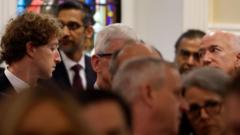In a striking prelude to his inauguration, President-elect Donald Trump gathered a host of tech billionaires at St. John's Church on Monday morning. Notable figures such as Amazon founder Jeff Bezos, Meta's Mark Zuckerberg, Apple CEO Tim Cook, and Google leader Sundar Pichai took prime seats alongside media mogul Rupert Murdoch and FIFA president Gianni Infantino.
This assemblage of powerful figures is especially notable given that many have openly criticized Trump during his earlier presidency regarding climate change and immigration policies. With rising concerns in the tech sector around regulation and scrutiny, the appearance of these executives at the church raises questions about their intentions as they seek to navigate the incoming administration.
Also attending were TikTok CEO Shou Zi Chou, OpenAI leader Sam Altman, Uber's Dara Khosrowshahi, and SpaceX and Tesla CEO Elon Musk, who has closely aligned himself with Trump after contributing significantly to his campaign.
The congregation of tech moguls at the church marks a rare union, reminiscent of a 2020 congressional hearing that scrutinized their influence. Many of these companies continue to face serious legal battles, with regulatory pressures growing in the wake of anti-monopoly lawsuits and investigations.
In a pointed letter last week, Democratic Senators Elizabeth Warren and Michael Bennett criticized the tech leaders’ willingness to align with Trump, suggesting they were attempting to evade scrutiny and curry favor. Altman responded by questioning why he hasn't received similar letters for his contributions to Democrats.
How the relationships between these tech figures and Trump will evolve remains speculative. As the former president, who experienced a tumultuous exit from office, embraced his renewed admiration from influential personalities, dissenting voices have emerged. Former strategist Steve Bannon labeled Musk "truly evil," expressing disapproval of the tech executives' newfound camaraderie with the president.
As Trump engages with this unique coalition, the implications on regulation and power dynamics in Washington are yet to unfold.



















